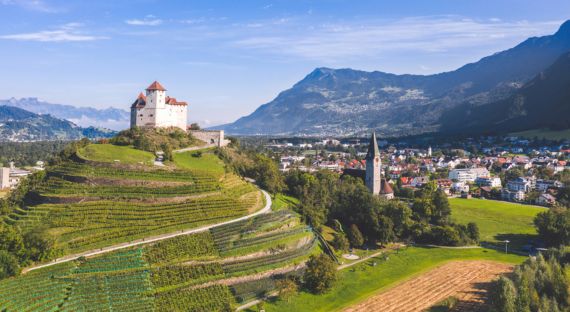By Rodgers Chawani and Kazuko Shirono
October 21, 2024
Liechtenstein is a winter sports destination and the only doubly-landlocked country in Europe. Find out more about the IMF’s 191st member
The IMF welcomed the Principality of Liechtenstein as its 191st member. Prime Minister Daniel Risch signed the IMF’s Articles of Agreement in a ceremony in Washington, D.C at the beginning of the 2024 Annual Meetings, which the country now attends as a full member.
Five Facts about Liechtenstein
Liechtenstein is one of only two doubly landlocked countries worldwide, along with Uzbekistan.
Among six smallest European states—Andorra, Malta, Monaco, San Marino, and Vatican City—Liechtenstein has the third-largest total area at 160 sq. km, comparable to the size of the city of Washington D.C. Liechtenstein is located between Austria and Switzerland in the Alps and is a winter sports destination. About 40,000 people call it home, half of the population of Andorra. Although Liechtenstein’s capital, Vaduz, is the best-known city in the principality, it’s not the largest; next-door Schaan has a larger population.
Liechtenstein is a parliamentary constitutional principality with a small civil service.
The 1921 constitution combines monarchy and democratic principles, defining the principality as “a constitutional, hereditary monarchy on a democratic and parliamentary basis.” The government consists of a five-member cabinet nominated by parliament and appointed by the prince for a four-year term. Liechtenstein has 1,500 civil servants, less than 4 percent of the population, significantly lower than the EU average of about 17 percent. Twenty-five members of parliament serve a four-year term.
Liechtenstein has the second highest per capita income in Europe, behind Monaco.
Liechtenstein’s per capita income of US$197K/year is substantially higher than that of most other small states and other European countries. High investment in research and development (6.2 percent of GDP) supports a globally-competitive and export-oriented manufacturing sector, which includes machine and tool engineering, plant construction, and precision and dental instruments, contributing to high incomes. The share of industry is high at 42 percent of gross value added, well above the EU average (about 15 percent). The financial sector, mostly based on private banking, wealth management, insurance, and trust services, accounts for about 20 percent of GDP.
The number of persons employed in Liechtenstein exceeds its population.
A distinctive feature of Liechtenstein’s economy is the large number of inward, cross-border commuters—from Austria, Germany, and Switzerland. Compared to a population of approximately 40,000, the workforce was 42,500 in 2022. About half of the workforce commutes daily from Switzerland (59 percent of commuters) or Austria (37 percent). Labor force participation is high (76.1 percent, vis-à-vis 74.9 percent in the EU), and the unemployment rate is below 2 percent.
Despite its small size, Liechtenstein is globally integrated.
The US, Germany, and Switzerland are among its most important export destinations. As part of the European Economic Area, Liechtenstein has full access to the EU’s single market, including financial markets, under the rules for free movement of services and capital. Building on access to the EU’s financial market and oversight by the European Banking Authority, Liechtenstein’s financial institutions have extended private wealth management networks outside the EU to Asia and the Middle East. Strong economic ties with Switzerland—including use of the Swiss franc—have also fostered trade and labor market integration.
****
Rodgers Chawani is a senior economist and Kazuko Shirono is a deputy chief. Both are in the IMF’s European Department.
Source link : http://www.bing.com/news/apiclick.aspx?ref=FexRss&aid=&tid=67167f3ae7de4430a0122c4cde6741ce&url=https%3A%2F%2Fwww.imf.org%2Fen%2FNews%2FArticles%2F2024%2F10%2F21%2Fcf-five-things-you-may-not-know-about-liechtenstein&c=1214361881489440360&mkt=de-de
Author :
Publish date : 2024-10-21 09:00:00
Copyright for syndicated content belongs to the linked Source.


